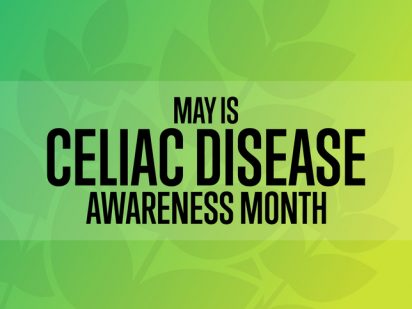By Kayla Cole, RDN, LRD, Outpatient Dietitian at Trinity Health
Having Celiac Disease for almost five years now, I try my best to keep upon the latest news, research, and products for both myself and my patients. Since May is Celiac Awareness Month, we are sharing some of the latest information regarding celiac disease.
First, here is some information from the Gluten Intolerance Group (https://gfco.org/).
The GFCO Global Certification Mark
The Gluten Intolerance Group (GIG), an industry leader in the certification of gluten-free products and food services, announced it is rebranding the Gluten-Free Certification Organization (GFCO) mark to support its expanding presence in international markets. To date, over 60,000 products from 51 countries have earned GFCO certification. The GFCO certification program protects consumers with gluten-related disorders by confirming that a product meets strict standards for gluten-free safety. GFCO companies will have until 2022 to completely adopt the new mark on packaging.
FDA Finalizes Rule Related to Gluten-Free Labeling for Foods Containing Fermented, Hydrolyzed Ingredients
The U.S. Food and Drug Administration issued a final rule to establish compliance requirements for fermented and hydrolyzed foods, or foods that contain fermented or hydrolyzed ingredients, and that bear the “gluten-free” claim. The rule pertains to foods such as soy sauce, yogurt, sauerkraut, pickles, cheese and green olives. Distilled foods, such as distilled vinegars, are also included in the final rule.
The final rule adds compliance requirements for hydrolyzed or fermented foods that use the “gluten-free” labeling claim, since gluten breaks down during these processes and currently available analytical methods cannot be used to determine if these products meet the “gluten-free” definition. The rule requires manufacturers of these food products to make and keep records providing adequate assurance that the food meets the definition of “gluten-free” before fermentation or hydrolysis; the manufacturer has adequately evaluated the potential for cross-contact with gluten during the manufacturing process; and if necessary, measures are in place to prevent the introduction of gluten into the food during the manufacturing process. The rule also discusses how FDA will verify compliance for distilled products. The definition of “gluten-free,” established in 2013, is not changed by this new final rule.
Below are a few updates from the Celiac Disease Foundation (https://celiac.org/).
Senate Releases FY2021 Language Directing NIH to Study Celiac Disease
The Senate Appropriations Committee for the Departments of Labor, Health and Human Services, Education, and Related Agencies has released their FY2021 funding recommendations, which for the second consecutive year includes report language directing the National Institutes of Health (NIH) to support celiac disease research.
Beginning with CEO Marilyn G. Geller’s 2019 testimony to the House and Senate Appropriations Subcommittees, the Celiac Disease Foundation has been boldly advocating for NIH to develop a strategic plan to find a cure for celiac disease. The FY2021 appropriations report language provides detailed instructions on how NIH is to continue to proceed with the study of celiac disease.
Society for the Study of Celiac Disease Releases Statement on COVID-19 Vaccination
The Society for the Study of Celiac Disease (SSCD) has released a statement on the COVID-19 vaccination and its safety for celiac disease patients. Read the full statement below or visit the SSCD website.
SSCD Statement on COVID-19 Vaccination
With the recent news that the Food and Drug Administration has granted Emergency Use Authorization for a vaccine against SARS-CoV-2, the virus that causes COVID-19, patients with celiac disease are asking for guidance about the advisability of this and other COVID-19 vaccines in the context of celiac disease, an immune-mediated condition. As scientists and clinicians who care for people with celiac disease, we urge people with celiac disease to receive a COVID-19 vaccine that has met government regulatory approval. This includes agents comprised of RNA (a vaccine technology that has been in development and has undergone safety testing for years) and peptide (protein) vaccines.
During the onset of the COVID-19 pandemic, there was initial concern that people with celiac disease might be at a slightly increased risk of severe outcomes from SARS-CoV-2 infection, given prior studies suggesting risks related to pneumonia and viral infections. Studies thus far, including the international registry (www.covidceliac.org), have indicated no increased risk of severe outcomes.
Treat Yourself – Once in a While
Last, but not least, we can’t leave out the most fun part: new food products! Now, yes, I am a dietitian, and I care about eating healthy and nutritious food, but it’s also about quality of life and enjoying some treats once in a while. These products include Nabisco® Gluten-Free Oreos® and Double-Stuff Gluten-Free Oreos®, Kraft® Gluten-Free Macaroni and Cheese, Cadbury® Mini Eggs, Hershey’s® Cookies ‘N’ Cream Egg, Nestle® KitKat® Mini Eggs, and Terry’s® Chocolate Orange Mini Eggs.

